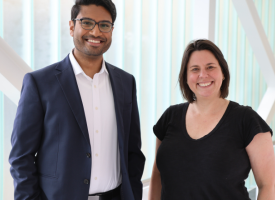Transcript - AMA Vice President on public hospital crisis (ABC News Breakfast)
Transcript: AMA Vice President, Dr Chris Moy,
Outlet: ABC News Breakfast, DATE Friday, 15 October 2021
Subject: Public hospitals in crisis
Host: Lisa Millar
LISA MILLAR: Returning to one of our major stories this morning, the Australian Medical Association is warning public hospitals across the country will be overwhelmed as states and territories reopen in the coming months. The organisation's Vice President Dr Chris Moy joins me now from Adelaide. Good morning Chris, welcome back to News Breakfast. What are you basing the warnings on?
CHRIS MOY: Essentially this report, which is called the Public Hospital's Cycle of Crisis, is based using hard government data. And it basically lays bare really hard on pretty frightening figures what we see every day; me as a GP, having trouble getting my patients the care they need, but also what patients feel all the time where they can't get the care they want, having to wait in a hot ambulance, being ramped. In terms of having to wait to be seen in an emergency department or wait to get a bed from the emergency department or wait to get surgery. Basically to say the whole system is choked up because there isn't enough beds and doctors and nurses in the system.
And what really has come out that's even more frightening is where we go from here. The figures here in the future look extremely scary in terms of the ability of people to get care. Basically, it's got to be very- there is a high chance you won't get care in the future if you need it, and I think the really poisonous cherry on the top is COVID because that's been added. All this data is before COVID, and the poisonous cherry is COVID on top, really will add another layer which will be like a brick coming down on a house of cards [indistinct] and really [indistinct] change.
LISA MILLAR: It's pretty dramatic to suggest that people won't get the care they need. What does that actually look like?
CHRIS MOY: Okay, let's give you some idea. So essentially the sort of numbers - I'll give you a couple of examples. The first is what we know is that the demand on- because there's a lack of beds in hospitals, the amount of emergency department admissions - that means the ones coming from emergency into the hospital are going to essentially double by 2030 and essentially going to be more than any other type of admission. What that means is you can't get anything else in there. You won't be able to get the normal care for, you know, like your surgery, elective surgery or your cancer care.
Now, I think the one that really struck me when I read the report was the amount of unmet demand. That means people not being able to get the healthcare that they actually need from the public hospital. So, at the moment it's running at about 4 per cent. So that means that 4 per cent of people can't get the care they want because there isn't the beds or the doctors or nurses to be able to provide that care. That is actually going to go up to something like about 14 per cent. Now, 14 per cent is about 1.4 million admissions per year which is actually more than the amount of elective surgery that is done per year. Or in simple terms, it's about a one in six chance or one in seven chance that you won't get the care that you need.
Now, I think that just gives you an idea, that leads to people getting sicker, more pain or potentially die. And I think given- I think the lesson we have learnt during COVID is that health is actually an investment. The health system and public health particularly has helped save we estimate about 40,000 people compared to the UK. It would be a terrible shame now to throw it away by not properly funding the system which actually did this and actually end up with people dying quietly because they can't get the care in the future.
LISA MILLAR: Yeah, so there's two things going on here. You are looking at this long term situation with the health system but also the short-term pressures from COVID. We've got headlines today saying far, far fewer people are ending up in hospital from COVID than anticipated because of the widespread vaccination rates. So will that not- is that not a good thing that we are seeing with those figures?
CHRIS MOY: It is tremendous that the vaccination is happening. But all this data is based on where we were coming into COVID and what we are going to project for other care. Look, the health system doesn't look just after COVID, it looks after everything else. The heart attacks, the surgery, the strokes, the cancer. It looks after everything else. COVID is on top of that. So, that is a really important thing to keep in mind.
From there, what we have done is actually given numbers about the effect of COVID on top of this. Now, the Doherty modelling has got some data. And also what has happened with our report is we have added what has actually been seen in the UK, the stuff that's actually been in the UK, and given some range of projections about where that sits. And whatever the case, it's already full. And so everything in terms of COVID - and COVID isn't just be going to be here for a few months, it's into the long term - it is going to be this layer which is really going to put just this extra pressure which is just unsustainable, both in terms of the number of beds [audio skip] but also the staffing that's required. And that's just really clearly accepted across the board.
LISA MILLAR: Well, we've certainly seen the debate between the states and the Federal Government. The Federal Government says there's been enough money, that's it. What- just briefly, what needs to happen?
CHRIS MOY: Therein lies the problem. We have a really silly funding formula which is essentially supposed to be a partnership, but essentially ends up with neither party really funding it enough. So the states and the Federal Governments don't fund it enough and all that ends up as we don't have enough beds and we don't have enough doctors and nurses.
I think the other things we need to do- we need a proper partnership where they actually fund the capacity that is required based on their own figures. As I said, this is based on their own figures. And I think the other thing is we need to actually fund general practice and the primary care out there to reduce- care for chronic disease so people are less likely to need the system, and also help the output. So, at the moment there is a very large number of people who really need aged care transfers or NDIS care who are stuck in hospital, who really are taking up beds which really could be used much better for people that actually need it because at the moment, the system is choked up at every- both in terms of going in and then coming out as well.
LISA MILLAR: Chris Moy, we're going to have to leave it there, but thank you.
CHRIS MOY: It's a pleasure.


